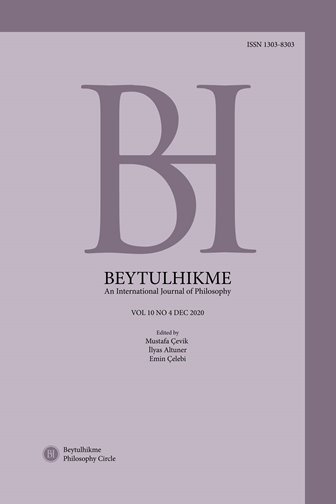Author :
Abstract
Sosyal bilimlerde sosyal gerçekliğin açıklanması ve anlaşılmasına yönelik birçok teori ortaya konulmuştur. Her teori söz konusu amaca yönelik bir takım imkânlar açığa çıkarırken beraberinde birçok açmazı ya da problemi de doğurmuştur. Sosyal bilimler tarihinde bu anlamda yapısalcılık önemli bir yer işgal etmektedir. Postyapısalcılık ise hem yapısalcılıkla bağı dolayımıyla hem de eleştirel tavrı itibarıyla bütün bir batı düşüncesinin eleştirisi anlamında çok önemlidir. Bu makale yapısalcılığın ve bütün bir batı metafizik geleneğin eleştirisinde oldukça merkezi konuma sahip Jacques Derrida’nın, yapısalcı dilbilimin kurucusu Saussure ve yapısalcılığı antropoloji yoluyla sosyal bilimlere taşımakta önemli bir role sahip Claude Lévi-Strauss’a eleştirileri ele alınmaya çalışılmıştır.
Keywords
Abstract
In the social sciences, many theories have been put forward for the explanation and understanding of social reality. Each theory reveals several possibilities for the purpose in question, as well as many dead ends or problems. Structuralism occupies an important place in the history of Social Sciences in this sense. On the other hand, post-structuralism is very important both in terms of its connection to structuralism and in terms of the criticism and critical attitude of all Western thought. This article attempts to address the criticism of Jacques Derrida, the founder of structuralist linguistics Saussure and Claude Lévi-Strauss, who played an important role in bringing structuralism into the social sciences through anthropology, which is very central to the criticism of structuralism and an entire Western metaphysical tradition.
Keywords
- Belsey, C. (2013). Postyapısalcılık. (Çev. N. Özge). Ankara: Dost Kitabevi
- Benton, T. & Craib, I. (2008). Sosyal Bilim Felsefesi. (Çev. Ü. Tatlıcan & B. Binay). İstanbul: Sentez Yayıncılık.
- Cevizci, A. (2005). Paradigma Felsefe Sözlüğü. İstanbul: Paradigma Yayınları.
- Derrida, J. (1999a). Differance. (Çev. Ö. Sözer). Toplumbilim, Jacques Derrida Özel Sayısı, 10.
- Derrida, J. (1999b). İnsan Bilimlerinin Söyleminde Yapı, Gösterge ve Oyun. (Çev. Ö. Gözel). Toplumbilim, Jacques Derrida Özel Sayısı, 10.
- Derrida, J. (2017). Garmatoloji. (Çev. İ. Berkan). Ankara: Bilgesu Yay.
- Elliot, A. (2017). Çağdaş Sosyal Teoriye Giriş. (Çev. İ. Yıldız & A. Görgün Baran). Ankara: Dipnot Yayınları.
- Hollinger, R. (2005). Postmodernizm ve Sosyal Bilimler. (Çev. A. Cevizci). İstanbul: Paradigma Yayınları.
- Iannone, A. P. (2000). Decontruction. Dictionary of World Philosophy. London and New York: Routledge.
- Keskin, İ. (2011). Sosyolojik Teoriler Bağlamında Yapısalcı Analizin İmkânı ve Sınırlılıkları. Beytulhikme An International Journal of Philosophy, 1 (2).
- Kristeva, J. & Derrida, J. (1999). Göstergebilim ve Gramatoloji. (Çev. T. Akşin). Toplumbilim: Jacques Derrida Özel Sayısı, 10.
- Küçükalp, K. (2020). Jacques Derrida: Felsefenin Dekonstrüksiyonu. İstanbul: Ketebe Yayınevi.
- Lévi-Strauss, C. (1994). Irk, Tarih ve Kültür. (Çev. H. Bayrı vd.) İstanbul: Metis Yayınları.
- Marshall, G. (1999). Sosyoloji Sözlüğü. (Çev. O. Akınhay & D. Kömürcü). Ankara: Bilim ve Sanat Yayınları.
- Norris, C. (2003). Deconstruction. London and New York: Routledge.
- Özlem, D. (1998). Evrenselcilik Mitosu ve Sosyal Bilimler. Sosyal Bilimleri Yeniden Düşünmek. İstanbul: Metis Yayınları.
- Ritzer, G. (2011). Sosyoloji Kuramları. (Çev. H. Hülür). Ankara: De Ki Yayınları.
- Sarup, M. (1997). Post-Yapısalcılık ve Post Modernizm. (Çev. A. Güçlü). Ankara: Ark
- Smith, P. (2005). Kültürel Kuram. (Çev. S. Güzelsarı & İ. Gündoğdu). İstanbul: Babil Yayınları.
- Swingewood, A. (1998). Sosyolojik Düşüncenin Kısa Tarihi. (Çev. O. Akınhay). Anka- ra: Bilim ve Sanat Yayınları.
- Thomas, H. & Walsh, D. F. (2012). Modernlik-Postmodernlik. (Çev. M. S. Ünal). Temel Sosyolojik Dikotomiler. (Ed. C. Jenks & ed. İ. Çapçıoğlu). Ankara: Birleşik Yayıncılık.
- Walsh, D. F. (2012). Yapı-Faillik. (Çev. İ. Çapçıoğlu). Temel Sosyolojik Dikotomiler. (Ed. C. Jenks & ed. İ. Çapçıoğlu). Ankara: Birleşik Yayıncılık. Öz: Sosyal bilimlerde sosyal gerçekliğin açıklanması ve anlaşılmasına yönelik birçok teori ortaya konulmuştur. Her teori söz konusu amaca yönelik bir takım imkânlar açığa çıkarırken beraberinde birçok açmazı ya da problemi de doğurmuştur. Sosyal bilimler tarihinde bu anlamda yapısalcılık önemli bir yer işgal etmektedir. Postyapısalcılık ise hem yapısalcılıkla bağı dolayımıyla hem de eleştirel tavrı itibarıyla bütün bir batı düşüncesinin eleştirisi anlamında çok önemlidir. Bu makale yapısalcılığın ve bütün bir batı metafizik geleneğin eleştirisinde oldukça merkezi konuma sahip Jacques Derrida’nın, yapısalcı dilbilimin kurucusu Saussure ve yapısalcılığı antropoloji yoluyla sosyal bilimlere taşımakta önemli bir role sahip Claude Lévi-Strauss’a eleştirileri ele alınmaya çalışılmıştır. Anahtar Kelimeler: Yapısalcılık, Sauussure, Lévi-Strauss, Derrida, yapı-bozum.





